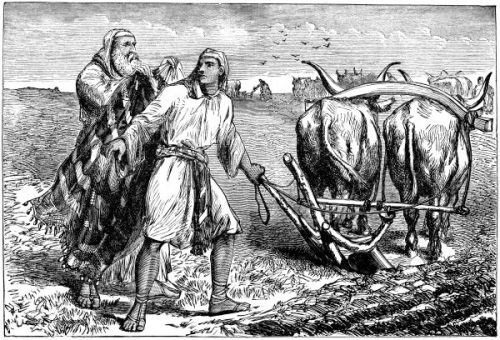In Luke 9:61-62, a would-be disciple tells Jesus, “I will follow you, Lord, but let me first say farewell to those at my home.” Jesus responds by reflecting on the radical commitment necessitated by his call: “No one who puts his hand to the plow and looks back is fit for the kingdom of God.”
If you know your Hebrew Bible well, you might notice some parallels between Jesus’ interaction with this would-be disciple and Elijah’s call of Elisha in 1 Kings 19:19-21. In both texts we note the plow imagery, a potential disciple requesting furlough to attend to matters at home, and the dynamics of the charismatic-prophetic figure enlisting disciples into service of his mission. This isn’t a coincidence. It would seem that Jesus sees the call of Elisha by Elijah as prototypical to His own call of disciples. But there is an important difference between Jesus and Elijah’s interactions with these potential disciples: where Elijah permits Elisha to return home, bid his family farewell, and offer a sacrifice of the oxen, Jesus doesn’t allow this would-be disciple to return home. This is Jesus’ intensification of the call to discipleship.
Here’s what I think is happening: Jesus is intentionally recreating this scene from the Hebrew Bible. Like other charismatic leaders of late Second Temple Period, Jesus can be counted as a scripture prophet – “prophets who searched the scripture to discover their own life and destiny in the pages of the Tanakh” (McKnight, 77). As Dodd observes, it was Jesus Himself who “directed the mind of His followers to certain parts of the scriptures as those in which they might find illumination upon the meaning of his mission and destiny…” (Dodd, 110).
The scripture prophet is guided by a self-understanding derived from some preceding religious texts or sources. In Luke 9:61-62, if Elijah’s call of Elisha is prototypical, Jesus is directing his disciples to see Him as a new Elijah – or possibly one greater than, but in the same tradition as, Elijah.
Jesus isn’t drawing our attention to Elijah’s call of Elisha for nothing. Jesus is using the language and imagery of this classic Hebrew story to help would-be disciples understand something about His own mission. Here we have a archetypal call narrative from the Old Testament – and Jesus puts a bold spin on it. In refusing this disciple leave, Jesus is making emphatic the exclusive and disruptive nature of His call, and his own sovereign authority. The urgency of Jesus’ message – and His own messianic authority – allows Him to break with social and even religious protocol. Likewise His disciples are expected to prioritize this mission above competing allegiances: comfort, safety, vocation, and even family.
